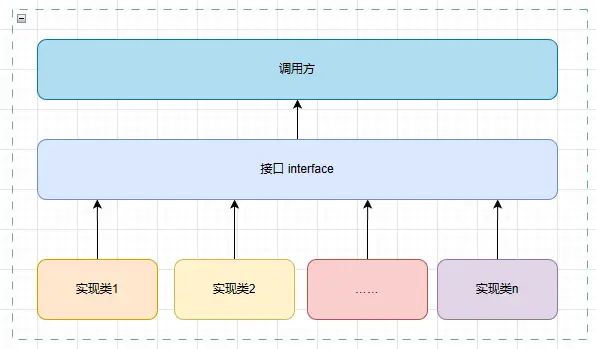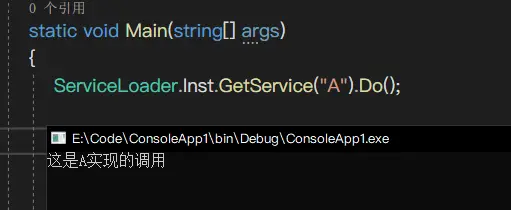.Net 一套接口多实现
.Net 一套接口多实现
接口(interface)可理解为规范、标准、协议。接口是用来约束各方都在同一组规范下工作。
电脑外设USB接口,各个品牌商家生产的U盘、鼠标都能够被电脑主板识别并工作,这是因为个生产商都遵循实现了USB接口协议。
在编程中接口应用非常广泛,例如IDbConnection接口,这是一组数据库连接的接口,由各个数据库驱动实现,因此.Net可以操作多种数据库。
一套接口多实现的基本结构如下

实现思路是,通过在各实现类上使用Attribute进行标记,然后定义一个实例获取类,通过反射获取所有实现该接口并且标记了的实现类,并将各个实现类通过IOC注册,然后通过标记的类型获取对应的实现类。
接下来是demo演示
定义服务标记
| [AttributeUsageAttribute(AttributeTargets.Class, Inherited = false, AllowMultiple = false)] | |
| public class MultiServiceTypeAttribute : Attribute | |
| { | |
| public string ServiceType { get; private set; } | |
| public MultiServiceTypeAttribute(string serviceType) | |
| { | |
| ServiceType = serviceType; | |
| } | |
| } |
定义接口IMultiInterface
| public interface IMultiInterface | |
| { | |
| void Do(); | |
| } |
定义实现类AMultiInterfaceImplA并标记
| [MultiServiceTypeAttribute("A")] | |
| public class MultiInterfaceImplA : IMultiInterface | |
| { | |
| public void Do() | |
| { | |
| Console.WriteLine("这是A实现的调用"); | |
| } | |
| } |
定义实现类BMultiInterfaceImplB并标记
| [MultiServiceTypeAttribute("B")] | |
| public class MultiInterfaceImplB : IMultiInterface | |
| { | |
| public void Do() | |
| { | |
| Console.WriteLine("这是B实现的调用"); | |
| } | |
| } |
将接口与实现添加到IOC容器,这里使用 Microsoft.Extensions.DependencyInjection.dll和Microsoft.Extensions.DependencyInjection.Abstractions.dll两个库来实现简易IOC容器
| public class ServiceLoader | |
| { | |
| private readonly ServiceCollection __ioc = new ServiceCollection(); | |
| private ServiceProvider __iocServiceProvider; | |
| private static object _lock = new object(); | |
| private static ServiceLoader _inst; | |
| public static ServiceLoader Inst | |
| { | |
| get | |
| { | |
| if (_inst == null) | |
| { | |
| lock (_lock) | |
| { | |
| if (_inst == null) | |
| { | |
| _inst = new ServiceLoader(); | |
| _inst.Init(); | |
| } | |
| } | |
| } | |
| return _inst; | |
| } | |
| } | |
| private void Init() | |
| { | |
| var tps = typeof(IMultiInterface).Assembly.GetTypes().Where(x => | |
| x.GetInterfaces().Any(_ => _.Name == nameof(IMultiInterface))); | |
| foreach (var item in tps) | |
| { | |
| if (item.IsClass) | |
| { | |
| Inst.AddTransient(typeof(IMultiInterface), item); | |
| } | |
| } | |
| Interlocked.Exchange(ref __iocServiceProvider, Inst.__ioc.BuildServiceProvider()); | |
| } | |
| private void AddTransient(Type iface, Type impl) | |
| { | |
| __ioc.AddTransient(iface, impl); | |
| } | |
| } |
根据标记的类型获取对应的接口实现。在ServiceLoader中继续添加以下方法
| public IMultiInterface GetService(string serviceType) | |
| { | |
| var svcList = __iocServiceProvider.GetServices<IMultiInterface>(); | |
| var svc = svcList.FirstOrDefault(x => x.GetType().GetCustomAttribute<MultiServiceTypeAttribute>()?.ServiceType == serviceType); | |
| if (svc == null) | |
| { | |
| //Console.WriteLine($@"未找到 {serviceType} 服务实现,使用默认实现"); | |
| // 如果有默认实现类,这里可选择调用默认实现 | |
| //svc = svcList.FirstOrDefault(x => x.GetType().GetCustomAttribute<MultiServiceTypeAttribute>()?.ServiceType == "__default__"); | |
| throw new Exception($"未找到 {serviceType} 服务实现"); | |
| } | |
| return svc; | |
| } |
通过ServiceLoader.Inst.GetService("serviceType").Do();来获取对应的接口实例,入参就是各个实现类上标记的类型,并调用接口。
调用示例如下

至此实现了一接口多实现的雏形。